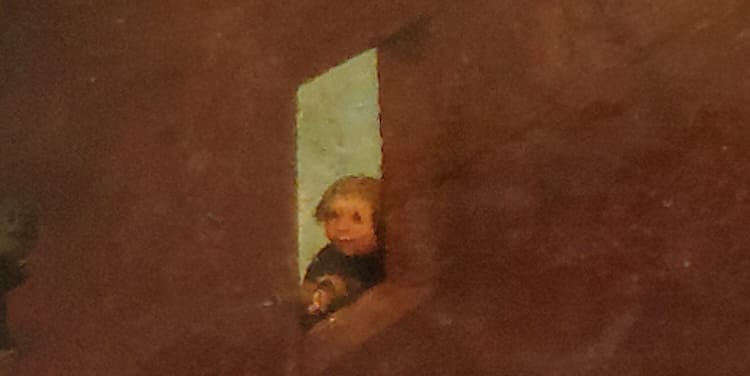On stage, four women, the “Marthes”, inspired by ecofeminist movements, are studying the ways of building a family. Far from the analytical discourse that argues for “the irreducibility of a form of transmission […] that has a subjective constitution, implying a relationship to a desire that is not anonymous” [2], their project is to “decenter the place of the human,” with “case studies, where animals challenge our ways of building families [3].” What does their creation teach us about the contemporary family discontent?
Before examining ethology, they explore History. They bring to life a group of medieval peasants living in a household, then a 19th century bourgeois family with its patriarch ruling over women and children, followed by a 1990s family mostly concerned with the children’s achievements and consumer-driven home improvement.
We arrive in the 21st century, the era of each performer’s own family. Their exchanges become intimate. But current events catch up with them: the “big orange, the American, Donald” for whom “the return of American women to the stoves” is necessary to “make America great again…” [4]. This return of the pater familias, who “had a right of life and death over his wife and children,” as they put it, depicts that “the father’s disappearance” [5] observed by Lacan brings forth a real, jouissant father.
Immediately afterward, a striking shift occurs with the arrival on stage of a termite queen. Sounds of jouissance, creeping, sighs, moans. A huge white garment, beautifully embroidered like a wedding dress – its beauty and finish sharply contrasting with the other accessories – barely veils the obscenity of the jouissance at stake. “The ultimate barrier, last defense against the Real, beauty, don’t touch it!” [6], Lacan taught. “Bring me another one! [7],” the queen repeatedly screams. Another king to fertilize her, as she lays forty thousand eggs a day. Directly correlated with the emergence of the real father, on stage, the jouissance of the unbarred, all-mother springs up.
The end of the play allows for a reading of its title, Family Vessel. The Marthes board a sailboat – a metaphor for a family with an “alternative genealogy.” The idea is to choose its members, including ancestors, “so that the past does not impose itself on the present [8].” They leave the harbor (port) shouting the slogan: “Make parents, not children!” They had already departed the phallic “haven” (port) [9], but this call for another kind of parenthood reveals a rejection of symbolic transmission, of desire and of the responsibility inherent to the family institution. Family and its discontents in the age of scientistic ideology.
[1] Collectif Marthe, Vaisseau Familles, directed, performed, and written by Clara Bonnet, Marie-Ange Gagnaux, Aurélia Lüscher, Itto Mehdaoui, 2024.
[2] Lacan J., “Note on the Child,” The Lacanian Review, no.04, 2018, p. 13
[3] Collectif Marthe, “Vaisseau familles”, available online.
[4] Transcribed by the author based on listening to the play.
[5] Lacan J., “1968 Note on the Father and Universalism” The Lacanian Review, no.03, 2017, p. 11
[6] Naveau L., “Beauté et pudeur”, available on the internet.
[7] Transcribed by the author based on listening to the play.
[8] Ibid.
[9] Freud S., “Femininity,” New Introductory Lectures on Psychoanalysis, SE, trans. Strachey, J., Hogarth, 1964, p. 129.
Translation: Laurence Maman
Proofreading: Alasdair Duncan







